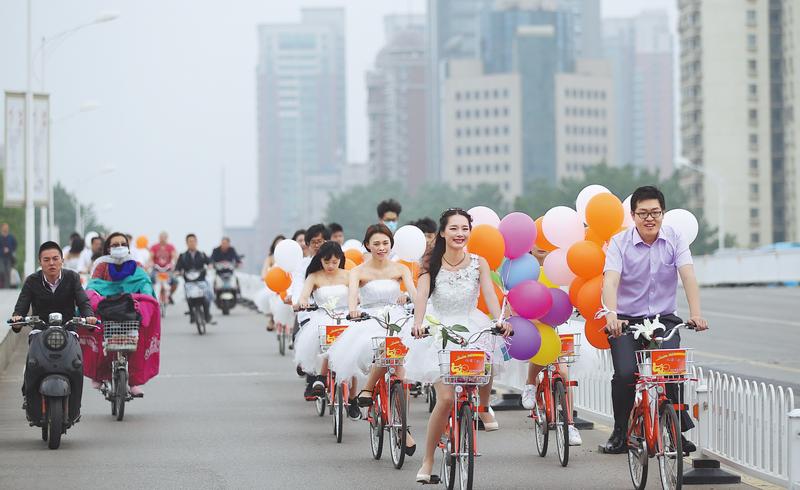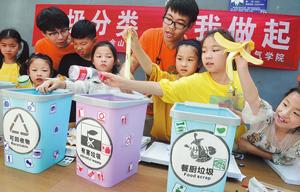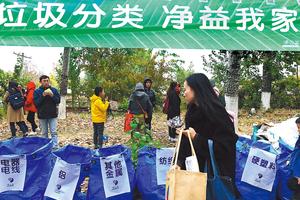Reusing products benefits communities and may even expand your social circle, Xu Lin reports.
 A couple ride bikes with friends at their wedding in Nanjing in May 2016. (YANG BO / CHINA NEWS SERVICE)
A couple ride bikes with friends at their wedding in Nanjing in May 2016. (YANG BO / CHINA NEWS SERVICE)
Waste not, want not, is a phrase that suggests if one does not squander, one will not be in need. Bie Shimin, 28, has adopted this approach as a way of life. While most of us drink our yummy milk tea in a fancy, disposable cup, Bie always asks the staff to fill her reusable bottle with the drink, and sips it with a stainless steel straw.
Committed to minimal waste, she always takes these items with her every day, plus a reusable lunchbox, chopsticks, handkerchief and a fabric shopping bag.
Bie became interested in "zero waste" two years ago when she sought to adopt a minimalist lifestyle. Reading online posts and joining activities like exchanging secondhand goods provided the useful tips she needed.
And for an item that I don’t need, I give it to friends or exchange it. Also, it’s convenient to sell and buy items on secondhand online platforms, like books and electrical products
Bie Shimin, 28, an office worker in Beijing who follows the zero waste lifestyle
"The zero waste lifestyle makes my life simple and it brings me pleasure," says Bie, an office worker from Beijing. "I've broadened my social circle by making friends with those who share the idea of zero waste. They're from all walks of life."
According to the recently released Survey on Low Carbon Consumption Awareness and Behaviors of the Chinese Households by market research company Ipsos, 41 percent of the 3,500 respondents agree that low carbon behavior will reduce waste, 33 percent say they believe it's good for sustainable development, and 32 percent hold that it will decrease air pollution.
Meanwhile, 33 percent of the surveyed say that low carbon behavior allows them to live a healthy life, and 25 percent say that it makes them live a simple and agreeable life.
The survey reveals that 31 percent want to learn how to identify low carbon products and 28 percent want to know how to calculate a product's carbon footprint.
Many of the surveyed households have adopted different low carbon behavior and one of the most popular is purchasing energy-saving electrical appliances.
The report states that over half of those surveyed set their air conditioners at a temperature of 26 degrees Celsius in summer so as to save energy, thanks to guidelines by the government, nongovernment organizations and the media.
The survey points out that a low carbon footprint and the ideal life that one wants are not mutually exclusive. It is important to provide the general public with practical guidelines about low carbon behaviors in daily life and promote them as a beneficial lifestyle.
For Bie, one major change of going zero waste is her choice of low carbon daily necessities.
Instead of turning to chemical detergents, she uses dried sponge-like gourd pulp and tea seed powder to wash dishes.
She frequents the Beijing Organic Farmer's Market and F2N Market, which sell various sustainable and environmentally friendly goods, to buy things such as shampoo and soaps.
She also buys facial toner and cream from a vendor that reuses the bottles and refills them.
To assuage her concerns about environmental protection, she has learned to use washable sanitary towels and a menstrual cup, a reusable feminine hygiene product to be worn inside the body to collect menstrual fluid.
 Two college student volunteers from Jiangsu University guide children in Zhenjiang in 2019 to learn to classify and dispose of waste correctly. (SHI YUCHENG / FOR CHINA DAILY)
Two college student volunteers from Jiangsu University guide children in Zhenjiang in 2019 to learn to classify and dispose of waste correctly. (SHI YUCHENG / FOR CHINA DAILY)
Peer support, family habits
Bie has made friends with many environmentally aware vendors and knows about how their goods are manufactured. She also collects plastic fillings used by delivery companies and gives them to these vendors for reuse.
Before shopping, she prepares different utensils-reusable lunchboxes for tofu, meat or cooked food, cloth bags for fruit and beans, and string bags for garlic and ginger.
"Some inspiration comes from the older generation," Bie says. "For example, before plastic bags were prevalent, they used to take bamboo baskets with them when they went to food markets."
Bie follows an essential rule-to refuse the purchase of new goods.
"And for an item that I don't need, I give it to friends or exchange it," she says. "Also, it's convenient to sell and buy items on secondhand online platforms, like books and electrical products."
Bie stuck to her ambitious plan of not buying new clothes throughout 2019. She exchanged secondhand clothes with her elder sister and friends who have also adopted a zero waste lifestyle.
"The method allows me to obtain clothes in a sustainable way," Bie says. "This way, I also have the chance to wear different styles of clothes that I've never tried before."
Bie knows it's important to have peer support in the zero waste community.
"If you want to try and adopt a new habit or some goods for the first time, you can always ask them for advice," she says.
For some people who adhere to a low carbon lifestyle, however, it can be a habit that's passed on from older generations.
Hu Yao, 34, a civil servant from Beijing, got used to separating dry and wet waste as a child.
She saves the waste water produced by the water purifier to wash vegetables first and then do housework. She economizes on electricity, and uses potato and carrot skins to cleanse the oil out of pans and bowls. She buys electrical appliances with low energy consumption.
She learned these life skills from her mother.
Hu says living costs in the capital are high, especially for housing and raising a child, so the family adopts these measures for economical reasons. Her mother also prefers refuse classification due to its cleanliness.
Her mother separates the sticky tape from packing boxes, throws it away and cuts the boxes into cardboard pieces to make learning cards for her grandson.
Hu's 4-year-old son has also learned about refuse classification at kindergarten via nursery rhymes.
"It's like a cultural inheritance within the family-I keep these habits due to education and the influence of my mother," Hu says.
"I believe my son will also carry on these habits, but for his generation, their impetus will be mainly about environmental protection."
Her son often wears old clothes from her friends' children. Her colleagues, according to Hu, like her, exchange secondhand clothes and toys with one another.
In Hu's eyes, old clothes may be even safer, since they were worn by other people thus "with less emission of formaldehyde", Hu says. "It also saves me much time, because, when I buy new clothes for my son, I will carefully read the labels to see if they are made of cotton or to what percentage for instance."
 Bie Shimin takes part in a public welfare activity about refuse classification in Beijing in November. (PHOTO PROVIDED TO CHINA DAILY)
Bie Shimin takes part in a public welfare activity about refuse classification in Beijing in November. (PHOTO PROVIDED TO CHINA DAILY)
Chance for better choices
Since the novel coronavirus outbreak, most Chinese are staying at home to curb the spread of the virus. Tian Zuning, brand and communication director of China Zero Waste Alliance, an environmental NGO, shares her ideas about how to go zero waste.
"To reduce the amount of disposable packaging, you can buy large-packaged items instead of small-sized ones packed separately, like snacks and milk," Tian says.
"You can give unwanted things to friends, sell or donate them to secondhand item platforms."
During the extraordinary circumstances, when people are encouraged to stay at home, food delivery has been resumed in big cities like Beijing, but Tian suggests that people reduce the frequency of their orders so as to decrease the physical contact with other people, as well as limit the usage of disposable boxes.
Tian suggests that people can learn or improve their cooking skills during this period.
"After forming the habit, some may bring their own lunchboxes to the office when the epidemic ends," she says.
"You can also learn to make drinks that you used to buy, like milk tea, and it's better to take your own cup when you buy it in the future."
As for disposable facial masks, she says, healthy people should disinfect them and put them in a bag, before disposing of them in a specific dustbin for masks, or to "the other waste" dustbin, if there is no such receptacle.
To avoid masks being recycled illegally, one could dye the mask with ink or cut it in half.
Use a mask based on its service life, rather than throw it away after using it only for a short time, Tian suggests.
During the outbreak, many people are working at home and have online conferences. More meetings can be held online rather than face-to-face after the epidemic ends, she says, and companies should champion the idea of zero waste, when they hold large conferences, to reduce carbon emissions.
For example, if they have to hold face-to-face conferences, they can reuse name tags on a desk and not use bottled water. They can also put stationery in a designated place for those who haven't brought a pen and paper, rather than putting a set on each seat.
Tian has become accustomed to living a low-carbon lifestyle after years of practicing a zero waste policy.
"When I purchase something, I'd first consider if it's environmentally friendly," she says, pointing out that she brings a cloth bag to shop in the food market instead of buying online to avoid over-packaging, and she picks transparent-bottled drinks over colored ones, since they are more recyclable.
"Going zero waste is a personal choice," Tian says. "You can choose the things that you can do to the best of your ability and encourage others to go zero waste as well."
Contact the writer at xulin@chinadaily.com.cn


